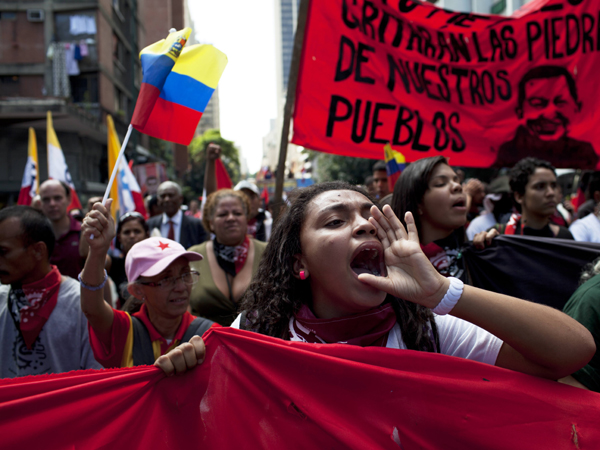
Members of a pro-government “colectivo,” or “collective,” march in downtown Caracas, Venezuela, Thursday, Feb. 20, 2014. President Nicolas Maduro and his supporters say the escalating protests against his socialist government in the oil-rich but economically struggling country are part of an attempted coup sponsored by right-wing and “fascist” opponents in Venezuela and abroad, particularly the United States. AP
LIMA, Peru — The battle for Venezuela is being fought as vigorously online as on the streets, with opposition activists tracking the government crackdown on social networks, and authorities fighting back by cutting Internet to a clash-torn city, and selectively blocking websites and a communication app popular with protesters.
Beatriz Font, a local TV reporter in San Cristobal, capital of the western border state of Tachira, said Thursday night that she could hear gunshots and police were breaking up protests just as they had the night before when Internet service was cut in this city.
“We’re still without Internet. And some people don’t have water or electricity either,” Font said from this university town which has seen some of the fiercest anti-government demonstrations.
Later, the U.S. company Zello said Venezuela’s state-run telecoms company, CANTV, had just blocked access to the push-to-talk, “walkie-talkie” application, a hugely popular organizing tool for protesters from Egypt to Ukraine.
The app for smartphones and computers supports up to 600 users on a single channel, and company CEO Bill Moore said it became the No. 1 app in Ukraine on Thursday for both the Apple and Android operating systems. In one day this week, Zello reported more than 150,000 downloads in Venezuela.
Some believe Venezuela’s information war, which last week included the government’s blocking of images on Twitter after violence in Caracas claimed three lives, is only just beginning.
The socialist government cemented a near-monopoly on the country’s broadcast media during the 14-year rule of President Hugo Chavez, who died last March, and social media have been crucial in recent days for opposition activists as they organized and exchanged information on deaths, injuries and arrests.
Net-savvy activists reported a serious nationwide degradation in Internet service provided by CANTV, which handles about 90 percent of the country’s traffic. They said websites including NTN24.com, a Colombia-based regional news network, and pastebin.com, bulletin boards that cyberactivists use to anonymously share information, were being blocked.
U.S.-based company Renesys, a top analyzer of global Internet traffic, confirmed the website blocking and service degradation, but said it could not determine if CANTV was decreasing bandwidth.
“I certainly don’t know from our data if it is deliberate, although given the context, it seems plausible,” said Renesys researcher Doug Madory.
Venezuela’s traffic to its close ally Cuba over the ALBA-1 cable, meanwhile, appeared unaffected, he said.
Programmer and cyberactivist Jose Luis Rivas, who is from San Cristobal but did give his location for fear of persecution, said the Internet went out in most of the city of 600,000 about midnight Wednesday.
All across Venezuela since street protests accelerated last week, opposition activists have posted online YouTube videos of riot police and national guard breaking them up. Sometimes the security forces are accompanied by pistol-packing motorcycle gangs of Chavista loyalists that the opposition also blames for killings and other abuses.
Rivas said that on Wednesday night, before the Internet went out in San Cristobal, people were live-streaming video of a crackdown by security forces.
Cutting the Internet deprived people of their only access to uncensored information and Rivas said people told him “they felt fear because they were no longer informed.”
Government officials have not commented on the Internet outage and did not respond to Associated Press queries on either it or the service degradation and website blocking.
Spokespeople for Conatel, the government telecommunications regulator, and the Ministry of Information, said they were not authorized to discuss the matter.
Conatel’s director, William Castillo, tweeted Thursday that social networks were being “invaded by cybercriminals who are attacking accounts and manipulating information.”
Information Minister Delcy Rodriguez used Twitter to complain that they were being used to incite “coup-directed violence and create anguish in a major psychological operation.”
Hacktivists have indeed been attacking government websites from abroad, rendering many unreachable with denial-of-service attacks that flood them with data packets.
Twitter complained last week that CANTV blocked access to images on the service, and company spokesman Nu Wexler said Thursday that it had since taken measures to “ensure continuity of service.”
Twitter also continued to tweet a workaround that lets users in Venezuela to receive tweets on their cellphones via text message.
Venezuela has been blocking websites that track the black market rate for the country’s currency for months and that blocked access for some weeks to the popular Web address-shortening application Bitly.
The international director of the Electronic Frontier Foundation, Danny O’Brien, said he thought the Venezuelan Internet censorship to be “somewhat haphazard and arbitrary,” indicating that not a great deal of thought had gone into it.
Nearly half of Venezuela’s population relies on government-controlled media as its sole information source, the rest on the Internet. But cutting off Internet is not smart political strategy, said O’Brien.
“I think the important lesson people should learn from these Internet blackouts is that they just throw fuel on the flames of civil unrest,” he said.